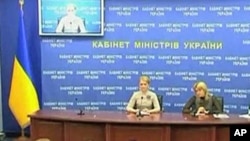Aides to Ukrainian presidential candidate Yulia Tymoshenko say she is planning a legal challenge to Sunday's presidential election results, which showed a victory for former Prime Minister Viktor Yanukovych. In any case, the new president will assume power with less than 50 percent of the vote and amid deep public distrust toward governmental institutions.
More than half of Ukraine's voters opposed Victor Yanukovych, the projected winner in Sunday's election.
And about four percent of ballots cast went to what was called "none of the above," meaning none of the candidates on the ballot.
This and the country's constitutional structure will force compromise, says Oleh Soskin, Director of the Society Transformation Institute in Kyiv.
"The new president will need to reach agreements," said Oleh Soskin. "Ukraine's constitutional structure does not lend itself to dictatorship."
He says the prime minister retains the greatest executive authority.
And considerable power is shared with parliament.
Outgoing President Victor Yuschenko failed, says Soskin, because he acted with little regard for other institutions of government.
Ukrainians too heap scorn on parliament, whose members have voted immunity from prosecution for themselves.
Analysts say they are elected through an undemocratic process that calls for presidential attention.
Courts are considered among the most corrupt institutions in Ukraine.
Yuriy Yakymenko, at Kyiv's Razumkov Center research institute, says judges are not independent of the president.
"The disease of any authority begins at the top," said Yuriy Yakymenko. "If we see politicized appointment of judges, and if we see the judicial system is not independent of other branches of government, then these are the primary factors that open the possibility of illegal influence on judges."
The Foreign Ministry is controlled by the president, but he often faces domestic pressure to pursue specific policies.
Eastern Ukraine, for example, has pushed for closer economic and cultural ties with Russia. Mr. Yanukovych has promised to pursue such goals.
Many in Western Ukraine oppose them, among them Dmytro Korchynsky, leader of the UNSO nationalist organization.
"We expect Yanukovych to go back on his promises [of closer ties with Russia] but if he doesn't, this will lead to the mobilization of nationalist elements in society," said Dmytro Korchynsky.
Some analysts say the president may be urged by oligarchs not to follow through on pro-Russian campaign promises.
They point out that while Russia is investing in Ukraine, Ukrainian oligarchs are putting more of their money in Western Europe.
Analyst Yuriy Yakymenko:
"If Russian capital penetrates Ukraine it can gradually assume commanding positions and undermine the position of Ukrainian oligarchs," he said. "Therefore, I do not think they will support policies of maximum openness for Russia and thus reorientation of Ukrainian [foreign policy] from West to East."
Ukraine's voters, says Soskin, are practiced at voting out politicians and parties they feel have betrayed them - first the Communists, then the Socialists and now President Yushchenko.
He says the new president will have to side with the people to clean up the country's institutions if he wishes to dodge the people's wrath.




